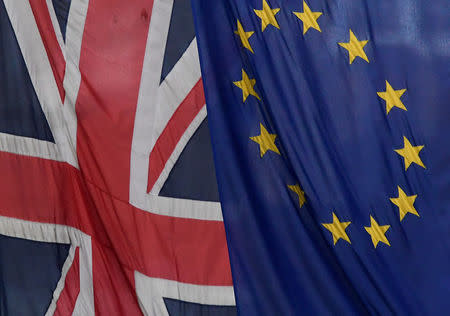Is Brexit trigger reversible? Irish court case planned

By Michael Holden LONDON (Reuters) - A crowdfunded legal challenge to determine whether Britain's divorce from the European Union can be reversed once it has been triggered will be submitted to the Irish High Court before Christmas, the lawyer behind the move said on Monday. British Prime Minister Theresa May plans to invoke Article 50 of the EU's Lisbon Treaty, the official means of leaving the bloc, by the end of March to launch two years of divorce talks. Lawyers for the British government have said the process is irrevocable once started, but some EU leaders say Britain can change its mind. Jolyon Maugham, a London tax lawyer, wants his case to go eventually to the European Court of Justice, the EU's highest court. "This case does not stop Brexit, it does not remove democratic control from parliament," he told Reuters. "It introduces a very simple safety valve in case time proves that the predictions of Brexit leading to some kind of economic revival for the country prove to be false. "If the facts change, it is possible that people's views will change and if people's views change it will be a pity if the country was compelled to do something which the electorate no longer wished." Maugham and his supporters raised 70,000 pounds ($90,000) in 48 hours to fund their challenge. He said they were aiming to sign up members of the European Parliament to front their case before submitting legal papers to the High Court in Dublin before Christmas. Ireland was chosen as the case had to be brought in the EU but outside the UK, and its legal system was similar to Britain's, he said. He said he hoped it could be referred to the European court in February. SINGLE MARKET Britain's Supreme Court is already considering a legal challenge over whether May can trigger Article 50 without parliament's approval, with a decision expected in January. Judges in London have said they assume the Brexit process is not reversible. "I can see the very compelling political reasons why the domestic courts may not have wanted to refer a matter associated with Brexit to the Court of Justice," Maugham said. His case will also seek to determine whether leaving the EU means Britain automatically leaves the European Economic Area (EEA). A third legal challenge is expected to begin at London's High Court this week to seek clarification on this issue, led by the pro-single market group British Influence. Membership of the EEA, which includes Norway, Iceland and Liechtenstein as well as the EU countries, entails access to the single market and free movement of goods, capital, services and people. "If we have the right to remain in the EEA whilst outside the EU, this prevents the EU using single market access as a 'bargaining chip', and would significantly enhance our negotiating hand," Peter Wilding, chairman of British Influence, wrote on the Conservative Home website on Sunday. Pro-Brexit activists have cast the legal challenges as attempts to use the law to hinder or overturn the result of June's referendum, in which 52 percent of Britons backed Brexit. "People have already expressed a view that they hope I spend the rest of my life looking over my shoulder fearing acts of violence," Maugham said. "I believe this is the right thing to do to ensure the best possible Brexit, if Brexit there is to be." (Editing by Guy Faulconbridge and Andrew Roche)
